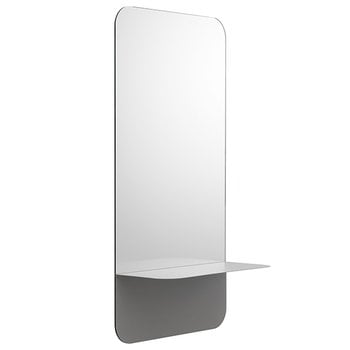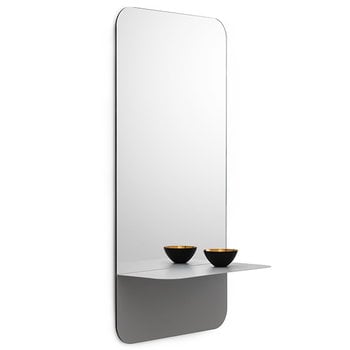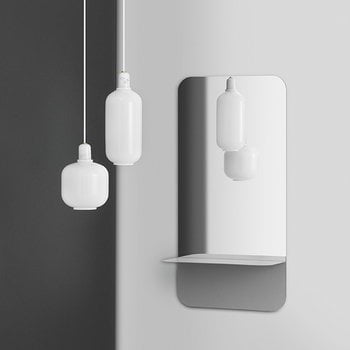The Horizon mirrors from Normann Copenhagen create a fun optical illusion – it looks as if their slender steel shelves have an identical twin. Designed by KaschKasch, the simple geometrical reflectors are a charming combination of aesthetics and functionality. The Horizon mirrors and their convenient shelves make a great addition to any hallway and dressing room.
Horizon mirror vertical, grey
Normann Copenhagen
Description
The Horizon mirrors from Normann Copenhagen create a fun optical illusion – it looks as if their slender steel shelves have an identical twin. Designed by KaschKasch, the simple geometrical reflectors are a charming combination of aesthetics and functionality. The Horizon mirrors and their convenient shelves make a great addition to any hallway and dressing room.
Product details (6)
- Material
- Powder coated steel, glass mirror
- Colour
- Grey
- Width
- 40 cm
- Height
- 80 cm
- Depth
- 17 cm
- Notes
- Clean with damp cloth
- Product ID
Designer
Kaschkasch is a German design studio founded in 2011 by Florian Kallus and Sebastian Schneider. The duo works in furniture, lighting design and art direction for several national and international clients. Kallus and Schneider share a background that combines hands-on and academic education: both are trained as cabinet makers followed by studies in product design. This versatility informs everything Kaschkasch does. The studio appreciates the hands-on insight, practice and technical understanding, which contributes to their design method: traditional craftsmanship techniques and a mindset geared towards innovation, disruption and new technological solutions.
View all productsReviews (0)
Sustainability
The Product Sustainability Framework, our criteria of sustainable design, helps you find the most sustainable products in our selection. Read below which sustainability criteria this product has met.
Working conditions & labour 7/9
-
Equal opportunities for all employees
-
Commitment to UN Global Compact, fair compensation for all employees
-
Corporate responsibility requirements defined and communicated for suppliers
-
Systematic work for improved inclusion and well-being in the workplace
-
Transparent supply chain
-
Suppliers' compliance to a code of conduct ensured
-
Compliance to the UN Guiding Principles on Business and Human Rights ensured in the supply chain
Eco-friendly production 6/9
-
Fair and resource-wise water-use in production
-
No incineration or landfilling of returned items
-
No use of endangered species as materials
-
No direct environmental emissions or waste (excl. GHGs) from production
-
Material-efficient and ecological packaging
-
No potentially harmful chemicals used in own production
Climate impact 4/8
-
Company's direct greenhouse gas emissions identified and commitment to reduction
-
Product's carbon impact identified and commitment to reduction
-
Guidance on energy- and eco-efficient use of the product
-
Contribution to climate initiatives beyond the brand’s direct operations
Sustainable materials 3/6
-
Sustainable and long-lasting material choices
-
No harmful or hazardous substances
-
Responsible raw material sourcing and production
Circular design 3/5
-
High aesthetic quality promoting long-term use of the product
-
Design for enduring life-long quality
-
Design and support for product maintenance, repair and upgradability










